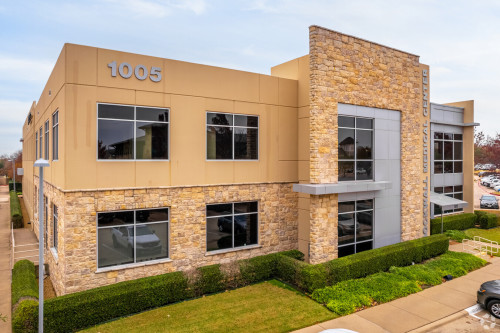

Connections Wellness Group Rockwall
Treatment Focus
This center treats substance use disorders and mental health conditions. You'll receive individualized care catered to your unique situation and diagnosis, learn practical skills for recovery, and make new connections in a restorative environment.
Primary Level of Care
Outpatient treatment offers flexible therapeutic and medical care without the need to stay overnight in a hospital or inpatient facility. Some centers offer intensive outpatient program (IOP), which falls between inpatient care and traditional outpatient service.
This provider hasn't verified their profile's information. Are you the owner of this center? Claim your listing to better manage your presence on Recovery.com.
Treatment Focus
This center treats substance use disorders and mental health conditions. You'll receive individualized care catered to your unique situation and diagnosis, learn practical skills for recovery, and make new connections in a restorative environment.
Primary Level of Care
Outpatient treatment offers flexible therapeutic and medical care without the need to stay overnight in a hospital or inpatient facility. Some centers offer intensive outpatient program (IOP), which falls between inpatient care and traditional outpatient service.
Provider's Policy
Our services are competitively priced, and we are in-network with most major insurance companies.
Connections Wellness Group Rockwall
Connections Wellness Group Rockwall
About Connections Wellness Group Rockwall
Connections Wellness Group is located in the Rockwall Medical Building with a mission to provide access to comprehensive mental health treatment services to residents in Rockwall, Texas. At this center, individuals can receive complimentary, same-day assessments before starting any services. The center offers various outpatient therapy services using an evidence-based approach. The private practice portion of their center offers both in-person and virtual services.
Intensive Outpatient Program (IOP)
Connections Wellness Group Rockwall offers two different general mental health IOP groups for adolescents and adults and a separate IOP for adults with a dual diagnosis of substance use disorder and another mental health concern. The IOP typically consists of 3 hours of group therapy per day that includes process groups, psychoeducational groups, experiential groups, and nursing groups. In addition, individuals will receive medication management and medication education. The program is typically 4-6 weeks long and at the end of treatment, clinical staff will collaborate with patients on an aftercare plan.
Partial Hospitalization Program (PHP)
The center offers two different general mental health PHP groups for adolescents and adults and a separate PHP for adults with a dual diagnosis of substance use disorder and another mental health concern. Each group meets 5 days a week for 4 hours at a time. The PHP consists of process groups, psychoeducation groups, and experiential groups. Individuals can receive a psychiatric evaluation, medication management, nursing evaluations, medication education, and family consultation through the PHP.
Adult Dual Diagnosis/Substance Use IOP and PHP
The adult dual diagnosis IOP and PHP groups are like the general mental health adult IOPs and PHPs, but focus on treating individuals with a substance use disorder and another mental health concern. Connections Wellness Group aims to decrease the likelihood of relapse by treating the whole person, and not just one aspect of their illness. Therapists are trained and certified in SMART recovery facilitation and techniques and will use a holistic approach and evidence-based therapies during treatment. This program at the Rockwall, Texas location is offered Monday-Friday. The PHP is offered 9am-1pm and the IOP is offered 9am-12pm.
Academic Support and Instruction
Connections Wellness Group's academic program is designed to complement the therapeutic care that students receive while in treatment. Their academic program is Cognia-accredited meaning all grades received during treatment are fully transferable to any school in any state. Students may also receive school credits while attending the program. There is no additional cost for students and families who use this program during treatment.

Highlights from the Center
Highlights
These highlights are provided by and paid for by the center.
Joint Commission Accredited
Center Overview
Treatment Focus
This center treats substance use disorders and mental health conditions. You'll receive individualized care catered to your unique situation and diagnosis, learn practical skills for recovery, and make new connections in a restorative environment.
Joint Commission Accredited
The Joint Commission accreditation is a voluntary, objective process that evaluates and accredits healthcare organizations (like treatment centers) based on performance standards designed to improve quality and safety for patients. To be accredited means the treatment center has been found to meet the Commission's standards for quality and safety in patient care.

Insurance Accepted
Cash Pay Rates
Estimated Cash Pay Rate
Center pricing can vary based on program and length of stay. Contact the center for more information. Recovery.com strives for price transparency so you can make an informed decision.
Levels of Care








Your Care Options
Specializations
Co-Occurring Disorders
A person with multiple mental health diagnoses, such as addiction and depression, has co-occurring disorders also called dual diagnosis.
Adolescents
Teens receive the treatment they need for mental health disorders and addiction, with the added support of educational and vocational services.
Who We Treat
Adolescents
Teens receive the treatment they need for mental health disorders and addiction, with the added support of educational and vocational services.
Approaches
Personalized Treatment
The specific needs, histories, and conditions of individual patients receive personalized, highly relevant care throughout their recovery journey.
Evidence-Based
A combination of scientifically rooted therapies and treatments make up evidence-based care, defined by their measured and proven results.
Individual Treatment
Individual care meets the needs of each patient, using personalized treatment to provide them the most relevant care and greatest chance of success.
Therapies
1-on-1 Counseling
Patient and therapist meet 1-on-1 to work through difficult emotions and behavioral challenges in a personal, private setting.
Family Therapy
Family therapy addresses group dynamics within a family system, with a focus on improving communication and interrupting unhealthy relationship patterns.
Acceptance and Commitment Therapy (ACT)
This cognitive behavioral therapy teaches patients to accept challenging feelings and make the appropriate changes to reach personal goals.
Psychoeducation
This method combines treatment with education, teaching patients about different paths toward recovery. This empowers them to make more effective decisions.
Art Therapy
Visual art invites patients to examine the emotions within their work, focusing on the process of creativity and its gentle therapeutic power.
Solution Focused, Goal-Oriented Therapy
A quick goal-oriented therapy that helps patients identify their current and future goals, find out how to achieve them, and empower future problem-solving.
Nutrition Counseling
Nutritious food helps patients heal from within, setting them up for mental and bodily wellness as they learn about healthy eating.
Conditions We Treat
Post Traumatic Stress Disorder
PTSD is a long-term mental health issue caused by a disturbing event or events. Symptoms include anxiety, dissociation, flashbacks, and intrusive thoughts.
Anxiety
Anxiety is a common mental health condition that can include excessive worry, panic attacks, physical tension, and increased blood pressure.
Depression
Symptoms of depression may include fatigue, a sense of numbness, and loss of interest in activities. This condition can range from mild to severe.
Grief and Loss
Grief is a natural reaction to loss, but severe grief can interfere with your ability to function. You can get treatment for this condition.
Obsessive Compulsive Disorder (OCD)
OCD is characterized by intrusive and distressing thoughts that drive repetitive behaviors. This pattern disrupts daily life and relationships.
Stress
Stress is a natural reaction to challenges, and it can even help you adapt. However, chronic stress can cause physical and mental health issues.
Bipolar
This mental health condition is characterized by extreme mood swings between depression, mania, and remission.
Trauma
Some traumatic events are so disturbing that they cause long-term mental health problems. Those ongoing issues can also be referred to as "trauma."
Self-Harm
The act of intentionally harming oneself, also called self-injury, is associated with mental health issues like depression.
Substances We Treat
Co-Occurring Disorders
A person with multiple mental health diagnoses, such as addiction and depression, has co-occurring disorders also called dual diagnosis.
Drug Addiction
Drug addiction is the excessive and repetitive use of substances, despite harmful consequences to a person's life, health, and relationships.
Alcohol
Using alcohol as a coping mechanism, or drinking excessively throughout the week, signals an alcohol use disorder.
Languages






